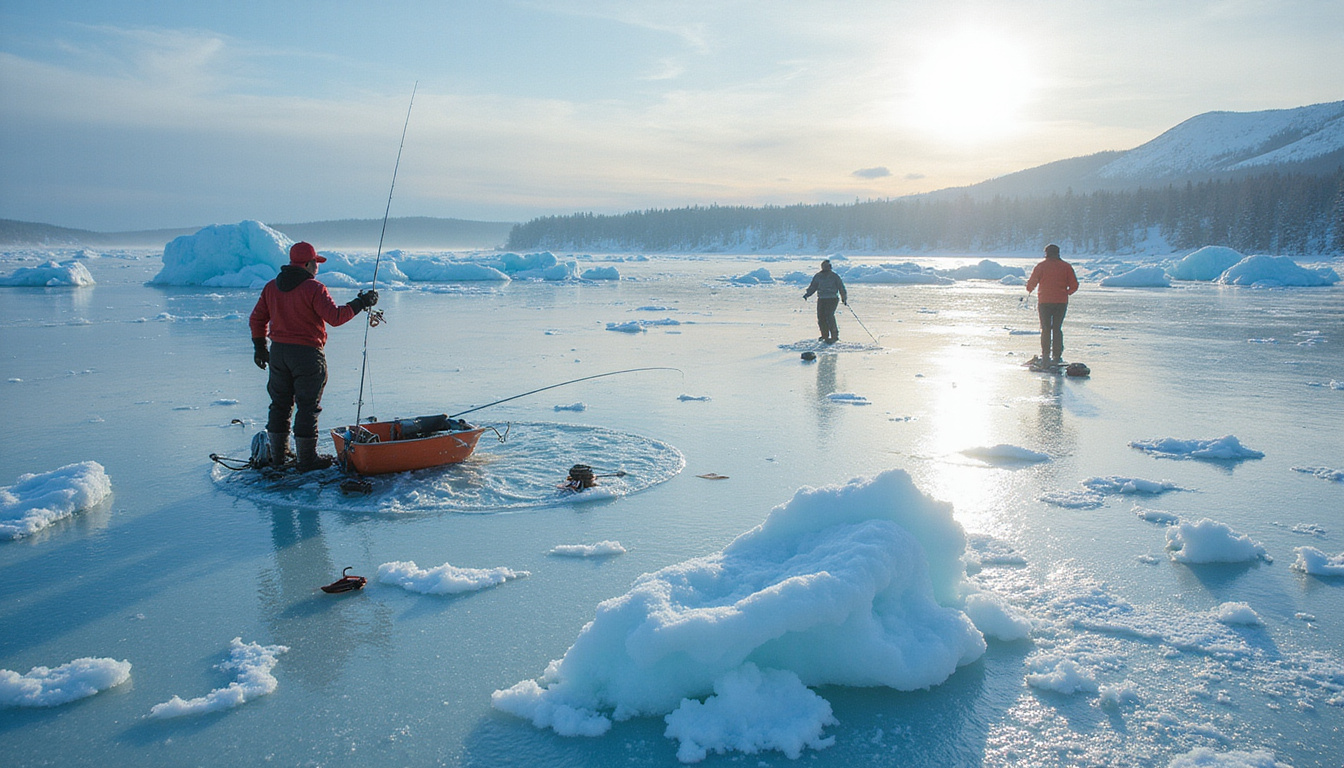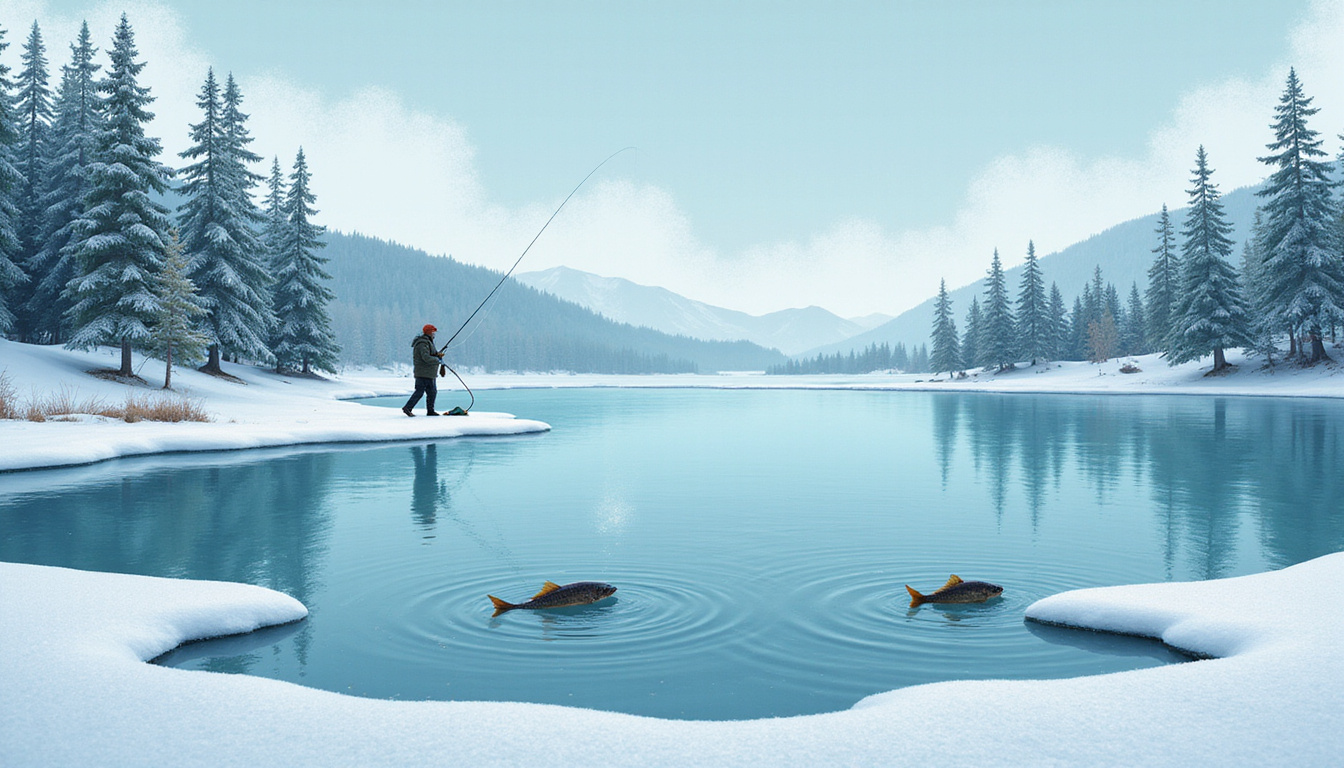
Transforming Our Tides: Ethical Ice Fishing Practices to Preserve Ecosystems
On May 9, 2025 by Andy FordAs winter blankets much of the northern hemisphere, ice fishing becomes a popular pastime for many outdoor enthusiasts.
However, as the popularity of this sport rises, it is essential to adopt ethical ice fishing practices to preserve ecosystems for future generations.
This article delves into the importance of ethical ice fishing and the ways in which anglers can safeguard aquatic environments while still enjoying this recreational activity.
Mastering Saltwater Fishing: A Complete Guide to Choosing the Right Fishing Line

Key Takeaways
- Ethical ice fishing practices are essential for maintaining aquatic ecosystems.
- Ice fishing can have significant negative impacts on fish populations and habitats.
- Implementing sustainable techniques can mitigate environmental harm during ice fishing.
- Community involvement is crucial for promoting awareness of ethical fishing practices.
- Collaborative initiatives can enhance the preservation of local ecosystems while allowing fishing activities.
Understanding Ethical Ice Fishing Practices
Engaging in ethical ice fishing practices to preserve ecosystems is crucial for anglers who wish to enjoy the sport while also protecting our natural resources.
As temperatures drop and lakes freeze, it can be tempting to drill a hole and start fishing without considering the impact on the habitat beneath the ice.
Ethical ice fishing not only respects fishing regulations but also promotes sustainability by ensuring that fish populations remain healthy and ecosystems function properly.
This includes practices such as using barbless hooks to minimize harm to fish, adhering to local weight and species limits, and avoiding overfishing by rotating fishing spots.
Moreover, responsible anglers minimize their environmental footprint by removing trash and respecting wildlife habitats around the fishing area.
By embracing these ethical ice fishing practices to preserve ecosystems, we can enjoy this winter pastime while ensuring future generations have the opportunity to fish in sustainable waters.
Impact of Ice Fishing on Aquatic Ecosystems
Ice fishing, a popular winter activity for many outdoor enthusiasts, can have a significant impact on aquatic ecosystems if not practiced responsibly.
Ethical ice fishing practices to preserve ecosystems are essential to maintaining the delicate balance within these environments.
Overfishing, improper waste disposal, and habitat disruption can lead to a decline in fish populations and affect other wildlife dependent on these habitats.
To mitigate these effects, anglers should adhere to local regulations, limit the number of fish caught, and avoid fishing in sensitive areas where breeding occurs.
By prioritizing ethical practices such as catch and release, using environmentally-friendly bait, and ensuring that any waste is properly disposed of, ice fishers can enjoy their sport while also protecting the aquatic ecosystems they rely on.
Additionally, participating in conservation efforts, such as habitat clean-ups and educational programs, further supports the health of our lakes and rivers, ensuring that ice fishing can be a sustainable hobby for generations to come.
‘The greatest danger to our future is apathy.’ – Jane Goodall
Mastering Saltwater Fishing: A Complete Guide to Choosing the Right Fishing Line

Implementing Sustainable Techniques for Ice Fishing
Ice fishing is a cherished winter pastime for many anglers, but it carries the responsibility to protect our aquatic environments.
Implementing sustainable techniques for ice fishing involves adopting e t h i c a l i c e f i s h i n g p r a c t i c e s t o p r e s e r v e e c o s y s t e m s that ensure the longevity and health of fish populations and their habitats.
To start, anglers should consider limiting their catch by adhering to local regulations, which often include bag limits and size restrictions.
Additionally, using barbless hooks can minimize injury to fish, allowing them a better chance of survival if released.
It’s also vital to be mindful of where holes are drilled; avoiding aquatic vegetation and habitats for spawning species can help maintain the delicate balance of these ecosystems.
Furthermore, anglers should educate themselves about the biodiversity in their fishing locales and participate in conservation efforts, such as cleanup initiatives around fishing sites.
By incorporating these e t h i c a l i c e f i s h i n g p r a c t i c e s, ice fishers can enjoy their experience while playing a crucial role in preserving the natural beauty and integrity of our water resources.
Community Involvement in Ethical Fishing Initiatives
Community involvement plays a crucial role in promoting ethical ice fishing practices to preserve ecosystems in our lakes and rivers.
By fostering a culture of responsibility and stewardship, local communities can significantly impact the sustainability of fish populations and their habitats.
Grassroots initiatives often bring together fishermen, environmental advocates, and regulatory bodies to educate the public about the importance of maintaining healthy aquatic ecosystems.
These collaborations may involve organizing workshops, clean-up events, and educational programs that highlight the adverse effects of overfishing and pollution.
Engaging community members not only empowers them to adopt ethical fishing methods but also cultivates a sense of ownership towards local environments.
This collective approach to ethical ice fishing practices ultimately ensures that future generations can enjoy and benefit from thriving ecosystems.
Frequently Asked Questions
What are ethical ice fishing practices?
Ethical ice fishing practices involve techniques that prioritize the sustainability of aquatic ecosystems while allowing anglers to enjoy the sport.
These practices include respecting size and catch limits, using eco-friendly bait, and minimizing disturbance to fish habitats.
How does ice fishing impact aquatic ecosystems?
Ice fishing can significantly impact aquatic ecosystems if not done responsibly.
Overfishing can deplete fish populations, and improperly managed waste can lead to pollution.
It is essential to understand these effects to adopt practices that help preserve the health of these ecosystems.
What sustainable techniques can I use while ice fishing?
Sustainable techniques for ice fishing include using traps that reduce bycatch, adhering to local catch limits, and fishing in designated areas.
Additionally, anglers can practice catch and release to help maintain fish populations and use biodegradable materials as much as possible.
How can communities get involved in ethical fishing initiatives?
Communities can get involved in ethical fishing initiatives through local workshops, conservation programs, and partnerships with fishing organizations.
Encouraging awareness and education about sustainable practices among anglers can foster a culture of responsibility.
Why is preserving ecosystems important for ice fishing?
Preserving ecosystems is vital for ice fishing as it ensures the longevity of fish populations and overall biodiversity.
Healthy aquatic ecosystems provide better fishing opportunities and enhance the recreational experience while supporting local economies that depend on ice fishing.
100% Free Ai trading Bot Click here for yours!
